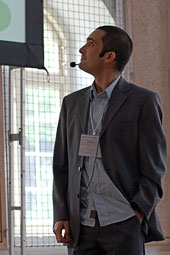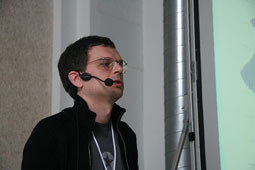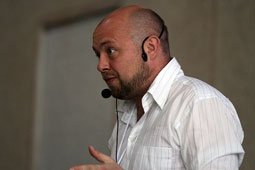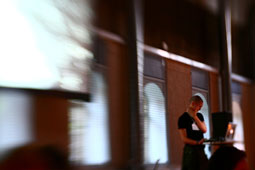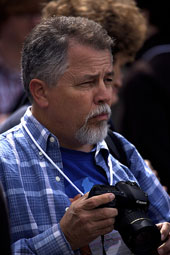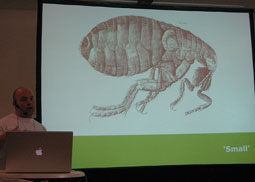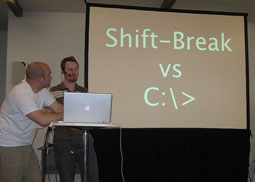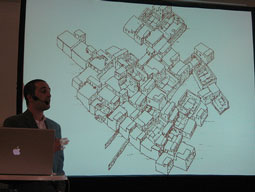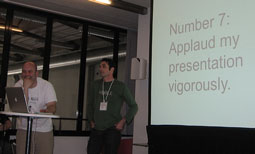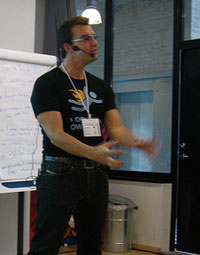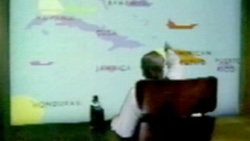- reboot8
- reboot8 Frappr Maps
- Technorati: reboot8
- Bruno Giussani's Lunch over IP
- Peter Rukavina: Thirty Two Short Films about Reboot Day One
- Nicole Simon's bloxpert: reboot podcasts
- Flickr: Photos tagged with reboot8
- Mindmaps from Larsz
- YouTube: videos tagged with reboot8
 Nicole Simon's podcasts
Nicole Simon's podcasts
Thursday, 1st of June 2006 |
||
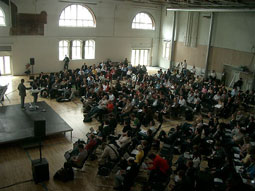 |
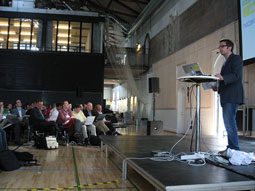 |
|
From Renaissance to renaissance?Michael Thomsen |
** (2 stars out of 3)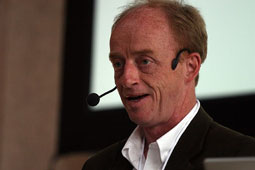 |
|
Making SensesMatt Webb The grand project of cataloguing the world (whether with barcodes or URLs) is - though only just begun - well under way. The next challenge is the one we faced when we first encountered a confusing, massive world, millions of years ago. |
***5++ senses as driving ideas to improve the web browser applications.
|
|
Visualisation put into perspectiveMichael Neutze Combining art and science, visualisation of complexity can be seen as a core renaissance component. The talk will link the developments in painting during the renaissance to today's visualisation techniques. Touching the works of Edward Tufte the talk aims to go further, especially with regard to the web and the possibilities of animation and interaction. |
***Tufte: data - ink ratio |
|
General Intellect - or the Renaissance of Karl MarxAdam Arvidsson With the end of the cold war, Marx was definitely out. But today we see a different kind of Marx emerging. With the term General Intellect, Marx actually predicted that knowledge, cooperation and social intelligence would realize a new mode of production that would emerge from within capitalism itself. This he argued had the potential to lead on to a post-capitalist civilization. Today we see this happening with the emergence of social software, P2P, Web 2.0, Wikis, Open Source and other forms of cooperative production systems.This talk departs from Marx concept of General Intellect to draw up a political economy of this new kind of cooperative mode of production. It draws out the implications for thinking about value in an economy of cooperation and thinks about the possible challenges that this can pose against the now dominant neoliberal order. |
*ethical economy |
|
Bit Literacy: A New Strategy for Productivity in Your Bit-drenched LifeMark Hurst This session will cover the high-level idea of bit literacy (a philosophy of productivity through emptiness in the bit-driven world) and show specific examples of how to attain it. Foremost among these is Gootodo.com, Hurst's bit-literate todo list. Hurst will also cover e-mail inbox management, which works in tandem with Gootodo. |
*** |
|
|
JP Rangaswami |
***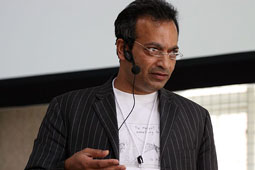
idenetity is where we belong toThings that will die:
|
|
The Global MicrobrandRick Segal and Hugh Mcleod The global Microbrand, The suits, and Jazzy Tunes. "What has a blogging Canadian VC, wild Cartoonist, and great musician got to do with Reboot? These crazy guys want to talk about and intrigue you with the notion of the global microbrand; what it means to you, your products, your services and your own brand. The internet affords the opportunity for everyone to be global yet be small. It is a powerful concept that opens up huge opportunities for everybody. Plus Hugh will draw some cartoon and Rick will give him money, live, on stage to the Preston's excellent sounds. What's not to love." |
***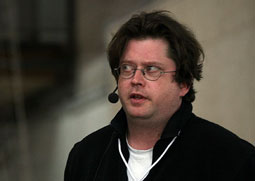 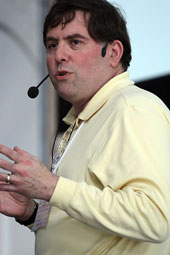 |
|
GTD – Getting Things Done |
**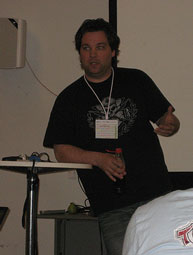 |
|
Mobile 2.0 - Social RenaissanceMarko Ahtisaari |
***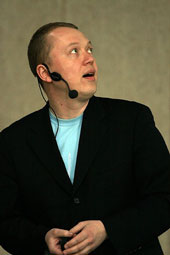 |
|
Zero-Effort Media UseMika Raento Emerging technology allows us to annotate, archive and share media with zero added effort. Just capturing media allows it to be used, instead of having to come back to your PC, connect cables, transfer and publish media. The lack of effort changes the economics around social use of media in somewhat conflicting ways: a) since sharing something required no effort, it doesn't have much value to the receiver either, but on the other hand b) since showing media requires no effort, it puts no burden on the watcher, and can be used in a more opportunistic manner. Captured media becomes a resource for social interaction, rather than the centerpiece of it. |
** |
|
Evening Event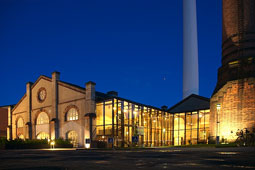
How to be a Renaissance ManBen Hemmersley |
*** |
|
Friday, 2nd of June 2006 |
||
Beyond Tagging: User-Generated Information ArchitectureJesse James Garrett |
***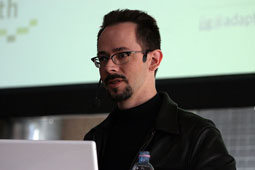 |
|
The Revolution Will Be Socialized: Social Architecture and The Future of Online MarketsStowe Boyd Apps Are a Collection of Functions, Right? Wrong. – The conventional wisdom about apps is all wrong. Functionality Is Secondary: The Social Dimension – People are the center of the universe 2.0 Start with Individuals: All The Reasons Why – People want immediate payback, so you have to give it to them... We Live in Networks: A World of Connections – ...but connecting people together in the context of some activity is the most critical thing any app can do Online Markets – Making something more liquid. The Revolution Will Be Socialized – All ecommerce in the future will be embedded in a rich social context |
*** *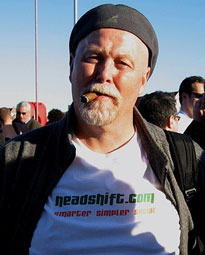 |
|
What Social Software Can Learn From Homer, Dickens, and Marvel ComicsTom Armitage Social software is playful, and much ludic analysis has been made of it. But what of narrative analysis? After all, we use this software to tell the grand serial narrative of our lives - cataloguing them via Flickr, journalling them (in whatever form) via our blogs. And then consider the wealth of parallel narratives many people have - a delicious account, a Flickr account, multiple blogs, LiveJournals, MySpace accounts, some contradictory, some anonymous, some fictional, some fact. This isn’t a bug, it’s a feature; we should encourage parallel storytelling, encourage the formation of personas, and make the interaction between these different platforms as complete as it needs to be to support this. We should design our software around these narrative impulses. In ten, twenty, thirty years time, for good or ill, we will want to look back at the stories we told - for they are part of our greater story. So as well as encouraging parallel narrative, we need to consider how best to support the long ongoing narrative that we weave. So: let's look at how, over history, serial narrative has been told, distributed, and retrospectively altered, and see what it tells us about the tools we build to tell our stories. |
*** |
|
Blind Men’s BaseballJyri Engeström Remember the aphorism about three blind men and the elephant? Imagine the three men were playing a baseball game. The only way they can communicate with their teammates is by shouting to each other. That's pretty much the way mobile handsets were designed to let us coordinate. I'll discuss the importance of peripheral vision and how enabling that could change our everyday lives and the web and mobile industries. |
***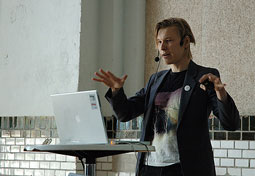 |
|
In Praise Of The HyperlinkJeremy Keith Moving away from the world-changing, blue-sky visions of the future, I'd like to concentrate on the simplest building block of the World Wide Web: the hyperlink. The Italian renaissance was characterised by a rediscovery of classical (Greek and Roman) ideas. Instead of just looking forward, there was an interest in the fundamental building blocks upon which art, science and philosophy of the time were based. I believe that the people who really "get" the idea of the web understand that what we are really doing now is recombining the Web's building blocks in new ways. The humble hyperlink is the best illustration of this. Google, with their page rank algorithm, were perhaps the trailblazers in understanding the inherent power and meaning contained in a simple link. Today, there is a renewed interest in clean, hackable, spiderable URLs. Additionally, microformats are building on the existing href attribute to add a new layer of semantic meaning to the existing Web. And as more and more APIs are opened up, the REST format is increasingly used over SOAP because it is, at heart, a straightforward URL with a query string. With an appreciation of the power of hypertext, we should be wary of any abuse of technologies that could hinder the act of linking. The recent renaissance of JavaScript and Ajax must be accompanied by a desire to keep the Web backwards compatible. Href values like "#" or "javascript:" will be seen as damage and routed around. In short, I'd like to deliver a love letter to the hyperlink, taking in its past, present and future role in our online world. |
***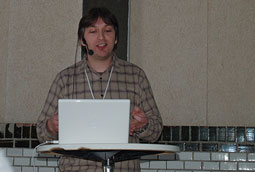 |
|
Markets 2.0Doc Searls |
*** * |
|
Mobile Web ApplicationsHåkon Wium LieWeb applications, often referred to as AJAX, are increasing in number and capabilities. Application developers now routinely target the Web instead of operating systems. A core set of Web Standards – HTML, CSS, JavaScript and DOM – form the foundation for most Web applications. One guiding principle of the Web is that there is only one Web; the same Web standards and the same Web content should be usable on all Web devices. As such, Web applications are challenging for mobile devices. For example, they often demand certain screen sizes. This talk will present the state of the art in Web Applications. Existing and emerging technologies will be discussed, and special emphasis will be put on extending desktop-based Web applications into the mobile Web. |
*** |
|
Pecha KuchaPecha Kucha is some bonkers micro-presentation format that groovy architects and designers have been trying out. The format is 20 slides with 20 seconds each (i.e. a 6.6 min presentation!) on absolutely any topic you like. |
*** *Making Public Data Public[er] |
|
ParticipationLee Bryant We talk about an "architecture of participation", but what do we mean by participation and how do we encourage it? We are not alone in asking this question – it has dominated debate about the future of politics in the UK and other European countries for some time, and there is a whole participation sector that exists to find answers. I will consider what we mean when we talk about participation, what can be learned from other disciplines on this subject and also how the scale and network effects of participation change the rules. |
*** |
|
There’s Something Going on Here That Is Bigger Than Any of Us (A hopeless idealist considers hyperlinks, organisations, life, the universe and everything.)Euan Semple |
***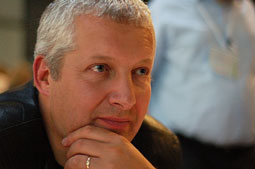 |
|
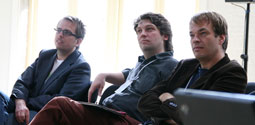 |
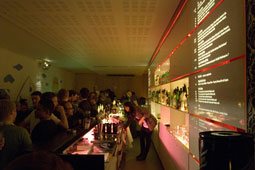 |
|
